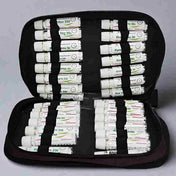Adlumia Fungosa Homeopathy Dilution 6C, 30C, 200C, 1M
Adlumia Fungosa Homeopathy Dilution 6C, 30C, 200C, 1M - Schwabe / 30 ML 6C is backordered and will ship as soon as it is back in stock.
Couldn't load pickup availability
Description
Description
About Adlumia Fungosa Homeopathic Dilution
Adlumia fungosa, also known as Climbing Fumitory or Allegheny Vine, is a lesser-known but uniquely effective remedy in homeopathy. This climbing plant, native to North America, is recognized for its delicate, fern-like foliage and graceful, vine-like structure. Homeopathically prepared from the aerial parts of the plant, Adlumia fungosa is valued for its distinct therapeutic properties, particularly in treating specific respiratory, rheumatic, and digestive conditions.
Clinical Indications and Health Benefits
Though not as widely used as other homeopathic remedies, Adlumia fungosa holds a special place in the treatment of targeted ailments. It follows the foundational principle of homeopathy that substances causing symptoms in a healthy individual can, in highly diluted forms, treat similar symptoms in someone who is unwell.
- Respiratory Health: Adlumia fungosa may be particularly beneficial for individuals suffering from certain types of coughs and bronchial issues, especially those accompanied by mucous congestion.
- Rheumatic Pain Relief: It is sometimes recommended for rheumatic pains that tend to migrate and fluctuate in intensity. This makes it a potential remedy for conditions like fibromyalgia or other forms of chronic pain where the symptoms are erratic and widespread.
- Digestive Support: This remedy is also noted for its application in cases of dyspepsia, flatulence, and gastro-duodenal ulcers, providing relief from discomfort associated with these digestive issues.
Plant Description and Composition
Adlumia fungosa is a biennial plant that can grow up to 3 meters tall. It features slender stems with delicate, deeply lobed leaves that transform into tendrils, allowing it to climb gracefully. The plant's leaves are elliptical or obovate, measuring 1-2 cm long and 5-10 mm wide, with finely dentate margins. The active constituents of Adlumia fungosa include alkaloids like D-Adlumin and Adlumin, which belong to the phthalidisoquinoline group, known for their physiological effects.
Traditional Uses and Modern Homeopathic Applications
In homeopathy, Adlumia fungosa is used for a wide range of conditions, including but not limited to:
- Gout and Hyperuricemia: Helps manage symptoms related to high levels of uric acid, such as joint pain and inflammation.
- Migraine Relief: Particularly for migraines that improve in the evening and with fresh air.
- Digestive Health: Effective for conditions like diaphragmatic hernia, rectitis, pruritus, and hepatitis.
- Mental and Emotional Well-being: Indicated for symptoms such as absentmindedness, irritability, and diminished sexual desire.
Dosage and Administration
The dosage of Adlumia fungosa, like other homeopathic remedies, varies based on the individual's condition, age, sensitivity, and other factors. It is commonly administered as 3-5 drops, 2-3 times a day, but in some cases, it may be given less frequently, depending on the severity and nature of the symptoms. It is essential to follow a qualified homeopath’s guidance to determine the appropriate dosage.
Safety and Side Effects
Homeopathic remedies, including Adlumia fungosa, are used in highly diluted forms, significantly reducing the risk of side effects. However, as with any medicinal substance, rare sensitivity reactions can occur. The remedy's safety profile is generally high when used under the supervision of a qualified homeopath. It’s important to note that the undiluted plant contains complex chemical compounds, and its internal use outside of homeopathic preparation should only be done under professional supervision due to potential toxicity.
Conclusion
Adlumia fungosa offers a unique therapeutic option in homeopathy, especially for those with specific respiratory, rheumatic, and digestive complaints. Its use highlights the individualized nature of homeopathic treatment, where remedies are chosen based on the complete symptom profile of the person. While side effects are minimal due to the nature of homeopathic dilution, professional guidance is recommended to ensure safe and effective use.
Safety Information:
- Read the label carefully before use.
- Use under medical supervision.
- Do not exceed the recommended dosage.
- Keep out of the reach of children.
- Store in a cool and dry place.










